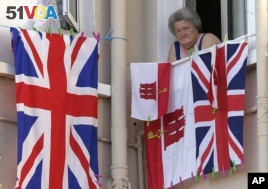June 14,2016
LONDON— As Britain prepares to vote later this month on remaining in the European Union, people living in the British overseas territory of Gibraltar feel particularly vulnerable.
The tiny rocky outcrop is at the southern tip of Spain and has been a continual source of tension between Madrid and London. One Spanish government minister recently suggested that a British exit could prompt a renewed push for shared sovereignty, despite that option having been rejected in a referendum in Gibraltar in 2002.
Red phone boxes, double-decker buses and pubs, Gibraltar is an unmistakable British outpost in southern Europe.

FILE - A woman resident of Gibraltar looks out of a window behind flags of England and Gibraltar, Aug. 4, 2004. For British-ruled Gibraltarians, London's membership in the EU prodives a safety net they would lose if Britain were to exit the EU.
The territory was ceded to Britain by Spain in 1713; a British vote to leave the EU could give a boost to Madrid’s hopes of reclaiming sovereignty over the territory, says Alasdair Pinkerton of Royal Holloway, University of London.
“It is part of the European treaty system that they’re not actively allowed to pursue a claim to Gibraltar, whilst Britain is a member of the European Union. So in a way, the European Union is protecting Gibraltar,” Pinkerton said.
Spain has in the past tightened border controls at times of heightened tension. Madrid has accused Gibraltarians of cross-border tobacco and liquor smuggling, and that could be used as a pretext for closing the frontier, effectively cutting off Gibraltar’s 30,000 residents.
“Like any sovereign state not bound by treaties, Spain would be absolutely entitled to close those borders to a territory that is no longer part of the European Union,” Pinkerton added.
‘Existential’ challenges
Gibraltar’s economy grew by more than 10 percent last year, fueled by its attractiveness as a low tax environment with access to the EU Single Market. Gibraltar’s leader, Fabian Picardo, fears the consequences of a vote to leave.
“How do you change your economic model to go from being able to sell to 520 million people to sell only to 32,000 people? These are challenges which are existential to the current economic model; we would have to completely reposition our economy, and it's something that's going to be very difficult,” he recently told reporters.
In Britain, polls suggest the "Leave" campaign has pulled ahead; but in Gibraltar a huge majority of residents say they will vote to stay in the European Union.
"There might be a lot of debate, as we say, 'You fight within the family, but you don't leave the family.' Because as British Prime Minister David Cameron said, 'What do you want to be, little England or little France?' We've got to be together.”
Campaigners who want to leave the EU say Spain already ignores the bloc’s rules on recognizing the territory’s sovereignty; but the people of Gibraltar fear a so-called Brexit could leave them cut off on the very tip of Europe.